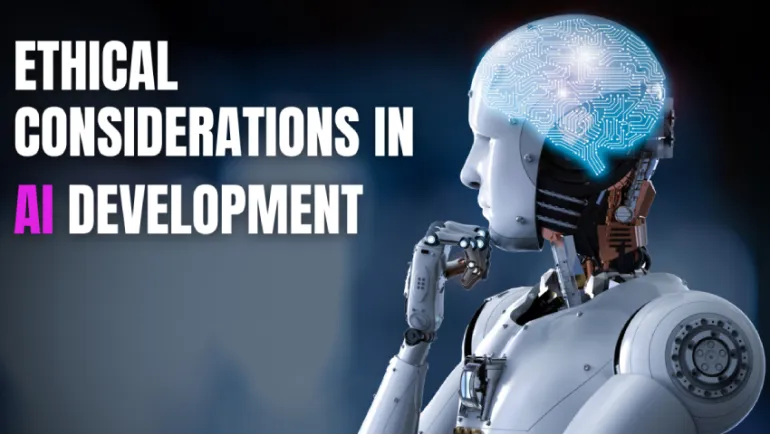
The rise of Artificial Intelligence (AI) has brought transformative changes across industries, enhancing efficiency, automation, and data analysis capabilities. From healthcare and finance to education and entertainment, AI systems are reshaping how humans interact with technology and each other. However, this technological evolution also presents complex ethical challenges, as AI’s growing influence raises critical questions about privacy, fairness, accountability, and social impact. To responsibly integrate AI into society, we must address these ethical considerations carefully and thoughtfully.
AI algorithms often require vast amounts of data to function effectively, particularly machine learning models that improve through exposure to real-world information. While this data enhances AI capabilities, it also introduces privacy risks. Much of the data collected includes sensitive, personal information that, if misused, could violate individuals’ privacy rights.
Informed consent is a central tenet of privacy ethics, requiring that individuals understand and agree to how their data will be collected, used, and stored. However, in practice, achieving truly informed consent can be challenging. Many people are unaware of how AI systems use their data, and consent forms can be overly complex. Clear, transparent data policies that prioritize user understanding are essential to maintaining ethical AI practices.
Data anonymization removing identifiable information from datasets is often cited as a way to mitigate privacy risks. However, re-identification attacks have shown that anonymized data can often be linked back to individuals by combining multiple data sources. This issue emphasizes the need for advanced anonymization techniques and robust security measures to protect data.
Moreover, companies and developers must implement stringent cybersecurity practices to prevent unauthorized access and data breaches. AI ethics in data privacy also extend to the need for secure data storage and handling practices, ensuring that sensitive information remains protected.
AI systems are only as unbiased as the data used to train them. If a dataset contains inherent biases, the AI system may perpetuate or even amplify these biases. For instance, facial recognition technologies have faced criticism for demonstrating lower accuracy rates among people of color and women, primarily due to biased training data. In sectors like hiring, lending, and law enforcement, these biases can result in discriminatory outcomes with severe consequences for affected individuals.
Mitigating bias requires conscious efforts in dataset selection, model design, and testing. Developers need to identify potential sources of bias, use diverse datasets, and continuously evaluate AI systems for fair and equitable outcomes. Additionally, a commitment to fairness may mean prioritizing accuracy across demographic groups over maximizing overall performance.
One of the most significant ethical challenges in AI is the "black box" nature of many machine learning models, where it is difficult to understand how a model arrived at a particular decision. This opacity can make it challenging to detect biases or errors, and it can prevent individuals from contesting decisions that affect them. Transparent AI systems, which allow for interpretability and explainability, are essential for ensuring fairness and accountability.
Who is Responsible? As AI systems become more autonomous, determining accountability for their actions becomes increasingly complex. If an AI-driven car causes an accident, who is responsible—the manufacturer, the software developer, or the user? When AI systems make decisions independently, especially in critical sectors, it raises questions about who bears responsibility for any harm or failure.
The lack of universal regulations on AI development contributes to ethical ambiguity. Different countries have different standards and levels of oversight, leading to inconsistencies in AI accountability worldwide. Governments and international bodies are increasingly considering guidelines for AI development, aiming to standardize ethical practices and protect public interests.
Automation and Economic Impact The rapid advancement of AI has sparked concerns about job displacement, as automation threatens to replace roles in various industries, particularly those involving repetitive or easily automated tasks. While AI-driven automation can lead to increased productivity and economic growth, it also risks exacerbating unemployment and income inequality, especially among workers in low-skill positions.
Instead of replacing human roles, AI can also augment human capabilities, allowing individuals to focus on complex, creative, or interpersonal tasks. Designing AI systems that enhance rather than replace human work is a responsible approach that prioritizes human welfare. This vision of AI as a collaborator rather than a competitor aligns with ethical values, fostering a future where technology complements rather than disrupts the workforce.
Autonomy and Surveillance AI has the potential to erode personal autonomy, particularly in surveillance applications. Facial recognition, behavior tracking, and predictive policing raise ethical concerns about surveillance and individual freedom. While these technologies can improve security and operational efficiency, they also risk infringing on personal liberties and privacy.
As AI systems become more integrated into daily life, there are concerns about how they might impact human relationships and social interaction. For example, AI-driven virtual assistants and companions may alter how individuals engage with each other and with technology, potentially leading to reduced human interaction and emotional fulfillment.
Designing for Inclusivity and Accessibility Inclusive AI design ensures that AI technologies serve diverse populations and are accessible to people of varying abilities, socioeconomic statuses, and backgrounds. This means considering factors like language support, accessibility features for individuals with disabilities, and affordability when developing AI systems.
Developers must consider the long-term implications of their work on society. Will an AI system promote positive social change, or could it reinforce harmful biases and inequalities? Ethical AI requires forward-thinking approaches that account for future societal effects, encouraging developers to anticipate and mitigate potential negative outcomes.
The ethical considerations in AI development are vast and multifaceted, encompassing privacy, fairness, accountability, and social impact. As AI continues to influence society, addressing these ethical challenges is crucial for ensuring that technology serves humanity rather than undermining it. By prioritizing ethics, we can harness the full potential of AI while safeguarding fundamental human rights and values, laying the foundation for a future where AI empowers and benefits all.












Comments
There are no comments for this Article.